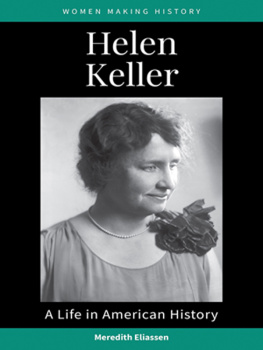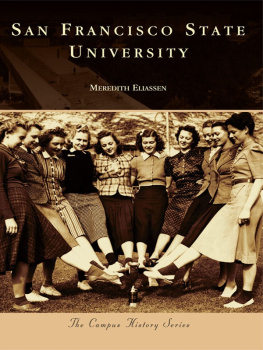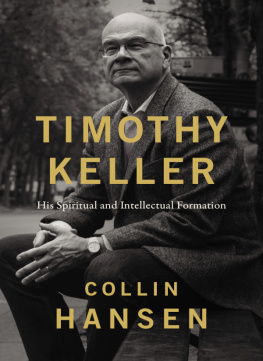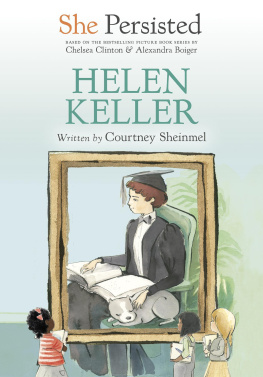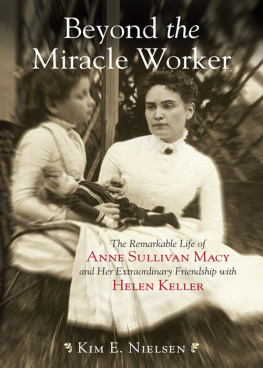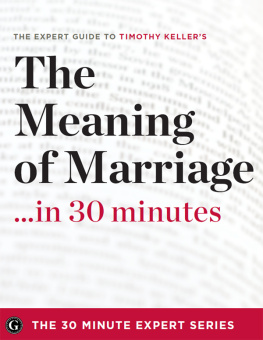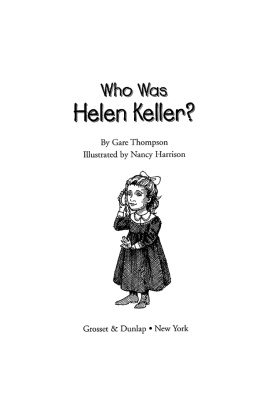Helen Keller
Recent Titles in
Women Making History
Ruth Bader Ginsburg: A Life in American History
Nancy Hendricks
Gloria Steinem: A Life in American History
William H. Pruden III
Hillary Clinton: A Life in American History
Kathleen Gronnerud
Helen Keller
A LIFE IN AMERICAN HISTORY
Meredith Eliassen
Women Making History
Rosanne Welch and Peg A. Lamphier, Series Editors

Copyright 2021 by ABC-CLIO, LLC
All rights reserved. No part of this publication may be reproduced, stored in a retrieval system, or transmitted, in any form or by any means, electronic, mechanical, photocopying, recording, or otherwise, except for the inclusion of brief quotations in a review, without prior permission in writing from the publisher.
Library of Congress Cataloging-in-Publication Data
Names: Eliassen, Meredith, author.
Title: Helen Keller : a life in American history / Meredith Eliassen.
Description: Santa Barbara, California : ABC-CLIO, [2021] | Series: Women making history | Includes bibliographical references and index.
Identifiers: LCCN 2021023102 (print) | LCCN 2021023103 (ebook) | ISBN 9781440874635 (hardcover ; alk. paper) | ISBN 9781440874642 (ebook)
Subjects: LCSH: Keller, Helen, 1880-1968. | Deafblind peopleUnited StatesBiography. | People with disabilitiesUnited StatesBiography. | Women social reformersUnited StatesBiography.
Classification: LCC HV1624.K4 E66 2021 (print) | LCC HV1624.K4 (ebook) | DDC 362.4/1092 [B]dc23
LC record available at https://lccn.loc.gov/2021023102
LC ebook record available at https://lccn.loc.gov/2021023103
ISBN: 978-1-4408-7463-5 (print)
978-1-4408-7464-2 (ebook)
252423222112345
This book is also available as an eBook.
ABC-CLIO
An Imprint of ABC-CLIO, LLC
ABC-CLIO, LLC
147 Castilian Drive
Santa Barbara, California 93117
www.abc-clio.com
This book is printed on acid-free paper 
Manufactured in the United States of America
Contents
We created this series because women today stand on the shoulders of those who came before them. They need to know the true power their foremothers had in shaping the world today and the obstacles those women overcame to achieve all that they have achieved and continue to achieve.
It is true that Gerda Lerner offered the first regular college course in womens history in 1963 and that, since then, womens history has become an academic discipline taught in nearly every American college and university. It is also true that womens history books number in the millions and cover a wealth of topics, time periods, and issues. Nonetheless, open any standard high school or college history textbook and you will find very few mentions of womens achievements or importance, and the few that do exist will be of the exceptional woman model, ghettoized to sidebars and footnotes.
With women missing from textbooks, students and citizens are allowed to believe that no woman ever meaningfully contributed to American history and that nothing women have ever done has had more than private, familial importance. In such books we do not learn that it was womens petitioning efforts that brought the Thirteenth Amendment abolishing slavery to Abraham Lincolns attention or that Social Security and child labor laws were the brainchild of Frances Perkins, the progressive female secretary of labor who was also the first woman appointed to a presidential cabinet.
Without this knowledge both female and male students are encouraged to think only menprimarily rich, white menhave ever done anything meaningful. This vision impedes our democracy in a nation that has finally become more aware of our beautiful diversity.
The National Bureau of Economic Research said women comprise the majority of college graduates in undergraduate institutions, law schools, and medical schools (56 percent in 2017). Still, womens high college attendance and graduation rates do not translate to equal pay or equal economic, political, or cultural power. There can be little argument that American women have made significant inroads toward equality in the last few decades, in spite of the ongoing dearth of women in normative approaches to American history teaching and writing. Hence, this series.
We want readers to know that we took the task of choosing the women to present seriously, adding new names to the list while looking to highlight new information about women we think we know. Many of these women have been written about in the past, but their lives were filtered through male or societal expectations. Here we hope the inclusion of the womens own words in the collection of primary documents we curated will finally allow them to speak for themselves about the issues that most mattered. The timeline will visually place them in history against events that hampered their efforts and alongside the events they created. Sidebars will give more detail on such events as the Triangle Shirtwaist Factory Fire. Finally, the chapter on Why She Matters will cement the reason such a woman deserves a new volume dedicated to her life.
Have we yet achieved parity? Well let one of our subjectsthe Honorable Ruth Bader Ginsburgremind us that when Im sometimes asked when will there be enough [women on the supreme court]? And I say when there are nine, people are shocked. But thered been nine men [for over 200 years], and nobodys ever raised a question about that.
The 1880s were characterized by tremendous transformation and unease in the United States as the nation entered the world stage as an economic and political force. When Helen Adams Keller (18801968) was born in the small southern town of Tuscumbia, Alabama, no one anticipated she would become a world-known writer and activist for the Deaf and Blind, women, people of color, and the working people. Concepts of gendered dependence, interdependence, and independence played out through Kellers life in a way that makes her both unique and universal. After the Alabama-born Deaf-Mute-Blind girl learned how to communicate, she entered a world of ideas where her physical limitations did not impede her success. Keller matters because she culturally delineated new female semantics and rhetoric related to disability, self-identity, and self-help.
Democracy in America is a political institution challenged from those on the outside who deplore it and from those on the inside who ignore it. Today we must deeply examine marginalized populations of the past within a framework of white supremacy to understand how it harms everyone. Helen Keller was a white woman who was profoundly marginalized by her double-disability of being Deaf-Blind. She acted through direct democracy with liberal and conservative actors reflecting the aspirations and concerns of common people.
Despite living with a teacher-guardian-promoter Anne Sullivan Macy, who occasionally misled, misinformed, and mistreated her, Keller developed an equilibrium within the pendulum of a political culture that swung between capitalism and individualism. For Keller, politics was not a polite invitation to participate. Politics called unrelentingly upon Kellers self-expressionit was a calling and call to action ultimately defining her as a significant female historical figure within American society.
Keller demonstrated a plucky, generous, and determined character. When a possibly preventable childhood illness made her Blind-Deaf-Mute, circumstances unceremoniously propelled her onto a public stage. Keller groped for a means to communicate and relate to seeing and hearing people. Solutions and challenges to Helen Kellers family dilemma of dealing with their disabled daughter were shaped by the legal doctrine of coverture.

